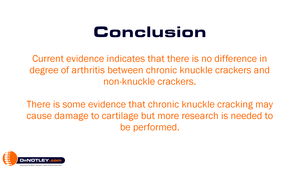
A number of years ago i wrote a post looking into the research of whether or not there is any harm in cracking your knuckles. An update on the subject is needed since knowledge can change over 6 years.
Chronic Cracking of your Knuckles and Arthritis
There isn’t much more research in chronic knuckle cracking and arthritis since I last posted. Two new papers were found during my search on this topic.
The Consequences of Habitual Knuckle Cracking (1975)
This study took 28 people who could recall whether or not they had or had not cracked their knuckles when they were younger. X-rays were taken of the hand. 28 school children were surveyed to determine the prevalence of knuckle cracking in children. One of the 15 knuckle crackers had radiographic signs of arthritis where as 5 of the 13 non-knuckle crackers had signs of arthritis. “The chief morbid consequence of knuckle cracking would appear to be its annoying effect on the observer.”
Effect of habitual knuckle cracking on hand function (1990)
This study took 300 people 74 of which were admitted knuckle crackers (amount of cracking per day was not indicated) for 18 to 60 years and 226 non-knuckle crackers. Six-four (64%) percent of knuckle crackers had an increase in hand swelling where as 5.75% had hand swelling (this was statistically significant). Comparing grip strength, the habitual knuckle crackers’ strength was significantly less than the non-knuckle crackers ( 210 (50) mmHg v 280 mmHg). The knuckle crackers were also more often manual labourers with higher incomes who frequently smoked, drank alcohol, and bit their nails. The signs of osteoarthritis (Heberden and Bouchard’s nodes) were similar between the groups.
Knuckle Cracking and Hand Osteoarthritis (2011)
In this study the authors sent out questionnaires to 319 participants. The questionnaires asked which fingers were cracked, how frequently, for how many years they cracked their knuckles, if there were any other risk factors for osteoarthritis and if they worked in manual labour for over 5 years. They received 215 surveys. Based on these questionnaires they determined there were no differences between controls and those with osteoarthritis based on number of years they cracked their knuckles, the frequency of cracking or working manual labour. They concluded, that there is no association between knuckle cracking and the prevalence of osteoarthritis of the hand.
When compared with subjects who are not habitual knuckle crackers, do habitual knuckle crackers have greater QuickDASH scores (a questionnaire for disability of the arm, shoulder and hand), swelling, weakness, joint laxity, or range of motion? The authors found there are no differences in QuickDASH scores, laxity and grip strength Range of motion comparisons between subjects with a history of habitual knuckle cracking versus subjects without such a history only yielded increased ROM in joints that cracked during manipulation.
Effects of habitual knuckle cracking on metacarpal cartilage thickness and grip strength (2017)
Thirty-five habitual knuckle crackers (cracking their joints ≥5 times/day) Cartilage thickness was measured with ultrasound and grip strength was measured. Grip strength was similar between groups Habitual knuckle crackers had thicker cartilage. Increased thickness may be an indication of edema of the cartilage which may be an early stage of OA.
Download the in depth summary on knuckle cracking from the link below.
Dr Notley – Does Cracking your Knuckles Lead to Arthritis
Conclusion
The evidence hasn’t changed much. Currently there is no difference in the degree of arthritis and being a chronic knuckle cracker. Cartilage damage could be occurring in those who chronically crack their knuckles but more research is needed.
Originally posted on May 17, 2022 @ 4:38 pm

